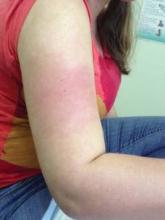SAN DIEGO – If a patient presents to your office with hives triggered by contact with water, think aquagenic urticaria.
"Aquagenic urticaria is a very rare disorder, with only about 100 cases reported in the medical literature," Patrick Coleman, a second-year medical student at the Uniformed Services University of the Health Sciences, Bethesda, Md., said in an interview. "Water is the inciting trigger. It’s followed by a wheal and flare response within 10-13 minutes. Sometimes it’s associated with pruritus. If it’s left untreated, it can resolve within an hour."
At the annual meeting of the American Academy of Family Physicians, Mr. Coleman and his colleagues discussed the case of a 24-year-old woman who presented to Dr. Robert P. Lennon at the department of family medicine at the U.S. Naval Hospital in Okinawa, Japan, with skin discoloration on her upper arms and legs, hives, and severe global pruritus after showering. Water challenge testing was positive, and the patient was successfully treated with a daily H1 antihistamine.
The hallmark feature of aquagenic urticaria is that the reaction is independent of water temperature. "So whether the water is cold or hot, the reaction will still occur," Mr. Coleman said. The pathogenesis of the condition is unclear, but may involve histamine release from the degranulation of mast cells. "Our patient was treated with an H1 antihistamine and she benefitted," said Mr. Coleman. "For other patients, the care may not be the same. You may need to try different antihistamines to see if they will control it."
In their poster, the researchers noted that urticarias affect 20% of people in the United States. Of these, 25% have urticarias that last more than 6 weeks. Only 10%-20% of urticarias have an identifiable trigger.
The researchers stated that they had no relevant financial disclosures.


